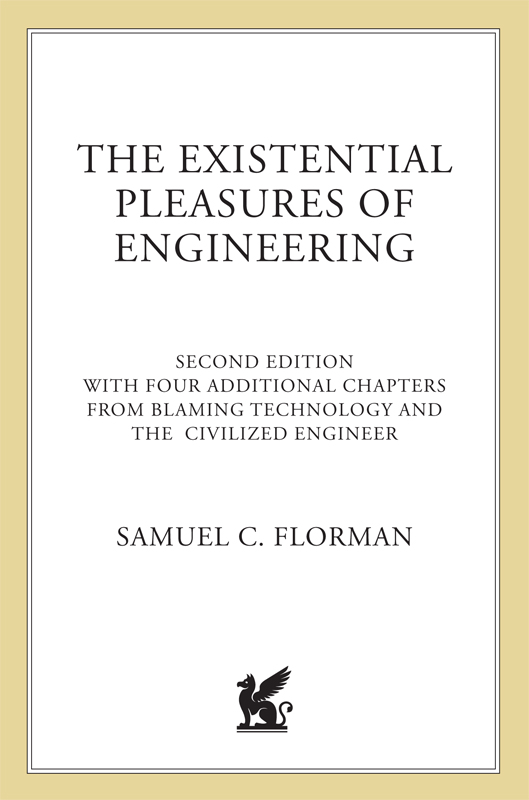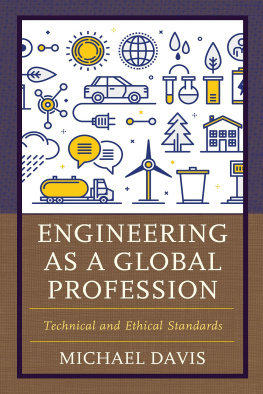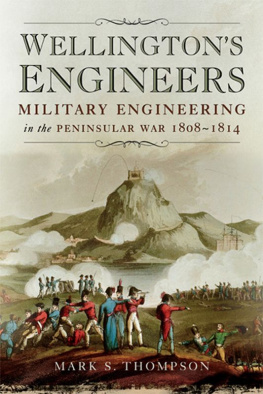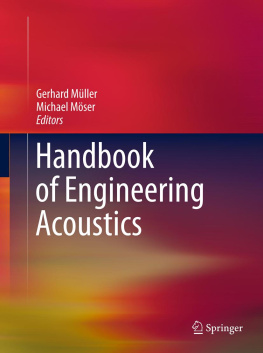Florman - The Existential Pleasures of Engineering
Here you can read online Florman - The Existential Pleasures of Engineering full text of the book (entire story) in english for free. Download pdf and epub, get meaning, cover and reviews about this ebook. City: New York, year: 1996, publisher: St. Martins Press;St. Martins Griffin, genre: Science. Description of the work, (preface) as well as reviews are available. Best literature library LitArk.com created for fans of good reading and offers a wide selection of genres:
Romance novel
Science fiction
Adventure
Detective
Science
History
Home and family
Prose
Art
Politics
Computer
Non-fiction
Religion
Business
Children
Humor
Choose a favorite category and find really read worthwhile books. Enjoy immersion in the world of imagination, feel the emotions of the characters or learn something new for yourself, make an fascinating discovery.

The Existential Pleasures of Engineering: summary, description and annotation
We offer to read an annotation, description, summary or preface (depends on what the author of the book "The Existential Pleasures of Engineering" wrote himself). If you haven't found the necessary information about the book — write in the comments, we will try to find it.
Florman: author's other books
Who wrote The Existential Pleasures of Engineering? Find out the surname, the name of the author of the book and a list of all author's works by series.
The Existential Pleasures of Engineering — read online for free the complete book (whole text) full work
Below is the text of the book, divided by pages. System saving the place of the last page read, allows you to conveniently read the book "The Existential Pleasures of Engineering" online for free, without having to search again every time where you left off. Put a bookmark, and you can go to the page where you finished reading at any time.
Font size:
Interval:
Bookmark:


The author and publisher have provided this e-book to you for your personal use only. You may not make this e-book publicly available in any way. Copyright infringement is against the law. If you believe the copy of this e-book you are reading infringes on the authors copyright, please notify the publisher at: us.macmillanusa.com/piracy.
Contents
FOR DAVID AND JONATHAN
in 1976, and again with love in 1994
PREFACE TO THE FIRST EDITION
Socrates said that the unconsidered life is not worth living. If the statement is valid, as I believe it is, then those of us who are engineers in the final quarter of the twentieth century are confronted with certain questions of compelling interest. What is the nature of the engineering experience in our time? What is it like to be an engineer at the moment that the profession has achieved unprecedented successes, and simultaneously is being accused of having brought our civilization to the brink of ruin?
Having posed these questions, it occurs to me that the answers are not without interest to all of usengineers, would-be engineers, and concerned citizens in a world where engineering, for better or for worse, plays an increasingly important role.
This speculative essay is an attempt to find answers to these questions, and, as it turns out, to challenge some of the conventional answers that are being given by others both within the profession and without.
What I have written is brief enough to speak for itself and does not require any formal introduction. But I do think that it would be helpful to make a few comments in advance about three key words which will be recurring in what is to follow. The words are engineering, technology, and existentialism.
Engineers and writers about engineering are constantly lamenting the confusion that is supposed to prevail in the public mind about the meaning of the word engineering. I believe that such confusion is much less widespread than it used to be. For example, it is hardly necessary to be forever explaining that professional engineers do not wear striped caps and drive locomotives. It is generally recognized, I think, that engineering is the art or science of making practical application of the knowledge of pure sciences. In other words, although engineers are not scientists, they study the sciences and use them to solve problems of practical interest, most typically by the process that we call creative design. Engineers are not mechanics, nor are they technicians. They are members of a profession. Although this profession has its roots in the earliest development of the human species, it only achieved recognition as a learned profession in the mid-nineteenth century, when scientific principles were first applied systematically to engineering problems, and when engineering schools and societies began to be established. In this book I have not attempted to describe in any detail what engineers do. Rather, my interest is in how engineers think and feel about what they do, and in the more general aspects of what it means to be an engineer.
Technology, like engineering, is a word that is constantly being defined and redefined. However, it is a word of such wide use and common understanding that I have chosen to take it pretty much as I find it, without bothering about linguistic or grammatical subtleties. Technology is a broader and more comprehensive term than engineering. Yet there is little question that engineers are the educated professionals who play a dominant role in technological development. Clearly the growing intellectual movement of antitechnology directs its hostility against the engineer as the archetypical technologist. Where I thought it appropriate, I have not hesitated to use the words technologist and engineer interchangeably.
Existentialism is a word that hardly anyone had heard of before it came into vogue after World War II. In this sense, existentialism is the newest of philosophies. Paradoxically, it is also the oldest of philosophies. This is so because its basic tenet is that existential thought precedes all formal philosophical deliberation. The existentialist is man saying to himself, I exist! The way I feel about this existence of mine means more to me than any theory in the world. Existentialism, as a philosophy, has been argued and embellished by the many different thinkers who have been characterized as existentialists. But I have restricted the use of the term to its most essential meaning, which I take to have two aspects: (1) rejection of dogmaparticularly scientific dogma; and (2) reliance on the passions, impulses, urges, and intuitions that are the basic ground of our personal existence.
At first glance, engineering and existentialism appear to have nothing to do with each other. The engineer uses the logic of science to achieve practical results. The existentialist is guided by the promptings of his heart, which, as Pascal said, has its reasons that reason cannot know. The existentialist most typically sees the engineer as an antagonist whose analytical methods and pragmatic approach to life are said to be desensitizing and soul deadeningin a word, antiexistential. To show that this adversary relationship is based on a misapprehension of the nature of the engineering experience isas can be surmised from the titlea principal objective of this book.
INTRODUCTION TO THE SECOND EDITION
Although this book was published in 1976, its origins date back to 1968. One evening in the fall of that year I received a telephone call inviting me to address a meeting at the New York Academy of Sciences. The monthly gatherings of the Academys Engineering Division are usually devoted to technical topics. On this occasion, however, the program directorseeking to add variety and a touch of spiceasked if I would be willing to consider engineering from a philosophical point of view. Somewhat impetuously I agreed to try.
This would have been a challenging assignment in the best of circumstances, but it was particularly daunting at that moment in our national history. War was raging in Vietnam, and American college campuses were being wracked by student demonstrations. The protests were directed mainly at the war, but also more generally at a heartless materialism that was said to have taken hold. Technology had become a word with evil implication, identified with weaponry, greed, and environmental degradation. The soft songs of the flower children blended with the wrathful chants of campus militants, making for an atmosphere in which engineers could not help feeling uneasy. I was sympathetic with much that the students were saying, and troubled by the failings of the industrial establishment with which most engineersmyself includedwere in some way affiliated.
Yet, as I set to work on my speech, guilt and misgiving yielded to a completely different state of mind. What is achieved, I wondered, by blind and angry protest? Surely folksinging and dropping out are not adequate responses to lifes challenges. Paradoxically, under the pressure of reproach I began to conceive a new regard for the profession of engineering.
When the designated evening arrived, my thoughts were still not fully formed, but I had written them down with such clarity as I could muster. My main theme was summed up in the title I chose: The Existential Pleasures of Engineering. This phrase seemed to tickle the audiences fancy; the speech itself was received with friendly bemusement. And that for the moment was that.
When, the following year, my remarks were reprinted in the Academys Transactions, I began to receive communiqus from all over the world. Yes, engineers told me, we, too, have strong, positive philosophical feelings about the work we do. Encouraged by that response, and animated by my own evolving interests, I resolved to explore the speechs ideas at greater length.
Font size:
Interval:
Bookmark:
Similar books «The Existential Pleasures of Engineering»
Look at similar books to The Existential Pleasures of Engineering. We have selected literature similar in name and meaning in the hope of providing readers with more options to find new, interesting, not yet read works.
Discussion, reviews of the book The Existential Pleasures of Engineering and just readers' own opinions. Leave your comments, write what you think about the work, its meaning or the main characters. Specify what exactly you liked and what you didn't like, and why you think so.




